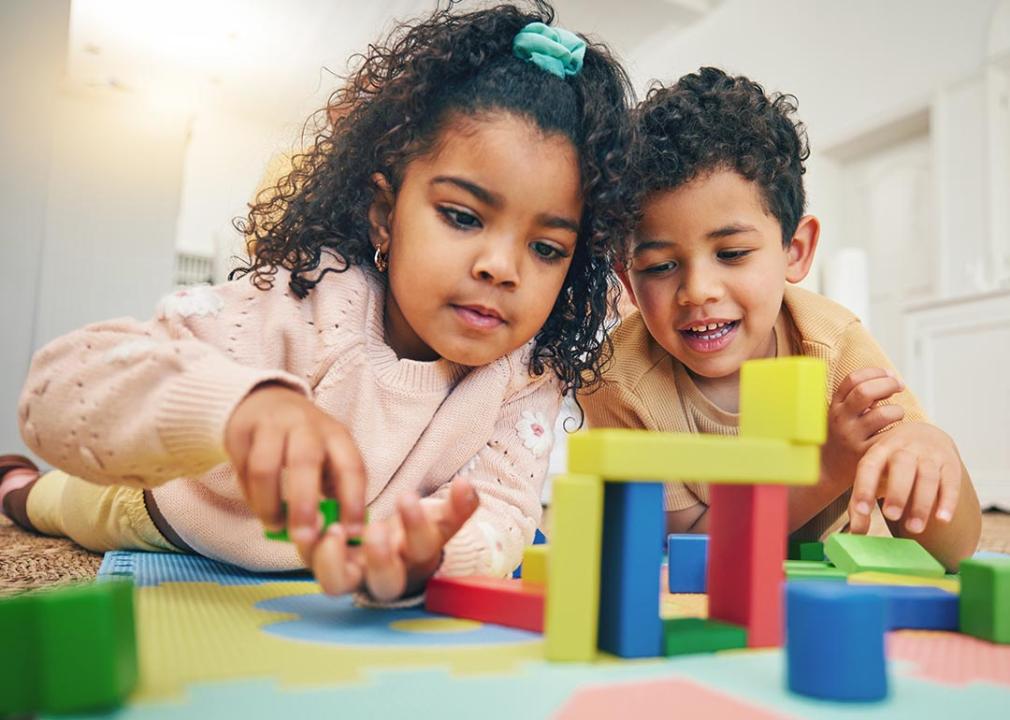Yes, play is good for children's mental health — Here's what the data says

Yuri A // Shutterstock
Yes, play is good for children’s mental health — Here’s what the data says
Two children and laying on their stomachs on the floor with toys for playing with building blocks.
Children are playing independently less than they used to — and, according to many experts, missing out on this quintessential childhood experience is taking a toll on their mental health. Some even say that decreased free play, defined as unstructured play without adult supervision, is fueling the youth mental health crisis more than social media usage.
To be sure, more time on screens, as well as an increase in parental supervision and academic pressures, may all contribute to the reduction in free play in the last half-century. Between 1950 and 2010, the average length of the school year in the United States increased by five weeks, and by 2014 the average elementary schooler spent less than 30 minutes a day in recess, data shows. Also, homework, which was once rare or nonexistent in elementary school, is now common even in kindergarten. All told, there’s less time for play.
Among the staunchest advocates of free play is renowned psychologist Dr. Peter Gray. In a 2011 study, Dr. Gray found that free play teaches young people how to learn decision-making and problem-solving skills, regulate their emotions, build friendships, and more. Without play, rates of anxiety, depression, suicide, and narcissism increase, the study posits. “Everything that I know about play suggests that if you take play away from children, there’s going to be negative consequences,” Dr. Gray told the Boston Globe earlier this year.
To assess how play impacts youth mental health, Charlie Health combed through the numbers, looking at data on how play is linked with happiness, social skills, and more. Keep reading to see what the data reveals.
Play is linked to stronger social skills among children
A 2015 review of 18 international studies involving about 50,000 children and youth found that play is positively associated with children’s social skills. The studies, which explored various types of risky play (a kind of free play that involves risk within safe boundaries), found that children who can disappear or get lost during play or play involving great heights or rough and tumble activities are shown to have increased social competence. Similarly, an earlier study of children (ages six months to 2.5 years) in an orphanage found that months of play improved social skills by nearly 50% (61.9 to 91.3 according to the study’s metrics).
Children’s physical ability is also linked to play
The same studies positively linked play with children’s physical abilities. The 2015 review found that risky play is linked to increased regular and intense physical activity in children. Similarly, after months of play, the children in the orphanage saw a roughly 30% increase in motor skills (63.7 to 91.3 according to the study’s metrics). According to the study, children in the orphanage also became more active, playful, and responsive with play.
Happiness and play are linked among children
Even a small amount of play is positively linked with happiness among children, one study found. According to research conducted in 2020 with 42 preschool children (aged four to six), one hour of play and 10 minutes of indoor mindfulness over five days increased children’s happiness by nearly 20% (pretest happiness score: 4; posttest happiness score: 4.7). This increase is considered significant according to the researchers.
Rising childhood ADHD rates may be linked to reduced free play
An increasing number of children are getting diagnosed with attention-deficit/hyperactivity disorder (ADHD), and free play could be part of the equation. One study found that reduced opportunities for preschool children to engage in spontaneous social play may contribute to rising ADHD diagnoses. The study notes that play helps develop the brain’s ability to regulate impulsive emotions — a classic symptom of ADHD, which may worsen without play, according to the study.
Similarly, a 2013 study of children found that more time spent in unstructured quiet play during toddler and preschool years correlated with better self-regulation abilities later on, even when earlier self-regulation skills and other factors were considered. Additionally, the 2013 study found that preschoolers who engaged in one to five hours of unstructured active play showed significant improvements in self-regulation two years later.
How to support children’s mental health through play
Supporting children’s mental health with play is, first and foremost, a systemic issue. Above all, providers, researchers, and lawmakers need to raise awareness of how play impacts mental health and create more opportunities for children to play. Below are some other steps that can be taken to promote play and children’s mental health.
Encourage free play
It may seem obvious, but encourage your children to engage in unstructured, self-directed play at any time during the day. As shown in the above studies, even a limited amount of free play can help young people develop social skills and improve their overall physical ability and happiness. Free play can include outdoor play, play with other children, and play using diverse materials, such as building blocks, art supplies, dress-up clothes, and more.
Limit screen time
A growing body of research suggests that prolonged screen time can negatively impact children’s physical health, sleep patterns, and social development. Instead, encourage activities that promote physical movement and creativity, such as outdoor play, sports, arts and crafts, and imaginative games. These activities not only support physical health but also foster social skills, cognitive development, and emotional well-being.
Seek play therapy (and mental healthcare) as needed
Just like play itself, data shows that play therapy (a therapeutic approach that uses play) can give children useful tools and experiences to manage and improve their mental health. If your child is struggling with their mental health, consider looking for providers or organizations that incorporate play therapy into treatment.
![]()
This story was produced by Charlie Health and reviewed and distributed by Stacker Media.
